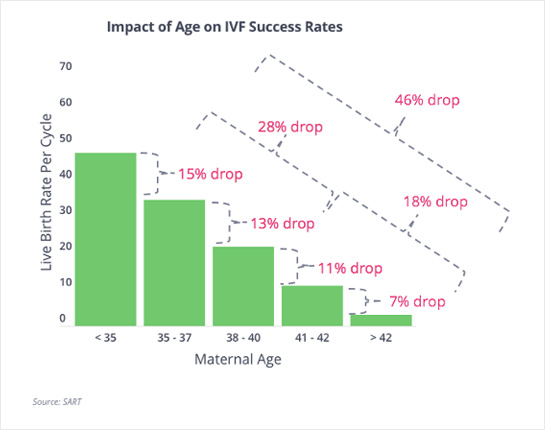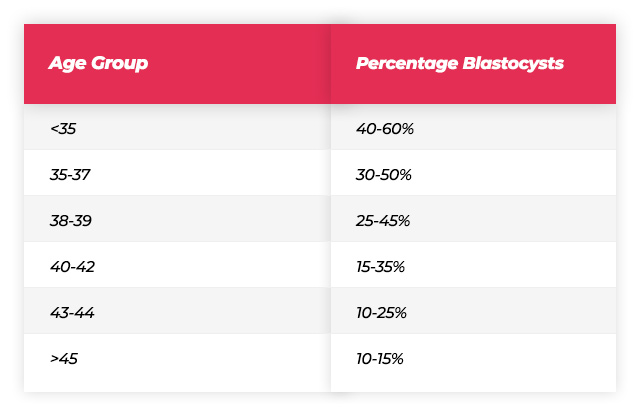
In the fourth month of the mother's womb, there are 6-7 million egg cells in the ovaries of the baby girl. Egg cells are physiologically destroyed over time, their number gradually decreases, and only 1-2 million egg cells remain at birth. After birth, this rapid loss of egg cells slows down, and by the time of the first menstrual age, 300-400 thousand egg cells remain.
About 300-400 times ovulation occurs once a month during the fertile period. The number of lifelong menstrual cycles varies between individuals depending to the different rate of destruction of women's eggs.
The decrease in the number of egg cells during fertility period is relatively constant, 1000 egg cells decrease per month on average, and the rate of loss increases after 37 years of age. The ageing eggs lose their capability of fertilisation, making their chances of implantation very low. At the age of 30, women have about 12% of the 300,000 eggs that they are born with. By the age of 40, only 9000 of them remain.
When the number of egg cells falls below 25 thousand, the decrease accelerates until the number of approximately 1000 egg cells is reached and menopause symptoms begin to appear. During the menopause period, the number of egg cells has decreased to less than 1000. Egg loss occurs very quickly before the expected menopause age for various reasons in women entering early menopause.
IVF success means a baby born alive after an IVF treatment cycle was started (by beginning medications to stimulate the ovaries). The likelihood of an IVF cycle leads to a live birth largely depends upon the age of the woman whose own eggs are being used during treatment.
The success rate is highest in women in their 20s and 30s and decline sharply after age 35 years. In a study it is demonsrated that 37% of women under age 35 had successful IVF implantation. The number decreased to 31% for women aged 35-37. Further, only 21% of women from the age of 38-40 could carry out pregnancy. The number dropped to 11% among women aged 41-42, and it only remained to 4% for women over the age of 42.
Hormone tests (follicle stimulating hormone (FSH),Estradiol (E2) and anti-Mullerian hormone (AMH) measurements) and the measurement of antral follicle number (Antral follicle count-AFC) by ultrasound can give an idea about whether the patient will respond well, moderately or poorly to IVF and ovulation treatments. With advancing age FSH levels increase and AMH levels decrease.
Women at age 40 and above have reduced fertility potential as compared to that seen in younger women. Each month, the average 30-year-old woman has about a 20% chance of getting pregnant naturally. A 40-year-old only has a 5% chance of getting pregnant each month.
The success rates with intrauterine insemination (IUI) can be as low as 5% for women in their 40s. They have also lower success rates with fertility treatments including IVF Treatment-about 15% per cycle. The percentage of live births per IVF cycle for women over 40 is only 5.8%.
The chance of having first baby at age 42 years after a maximum of 2 complete cycles of IVF (A complete cycle includes all fresh and frozen-thawed embryo transfers resulting from one egg collection) is 19.23%. This means that out of 100 couples undertaking a maximum of 2 complete cycles, approximately 19 would have a baby.
At age 43 the chance of having first baby after the 1st complete cycle of IVF is: 7.67%. This means that out of 100 couples undertaking a 1st complete cycle, approximately 8 would have a baby. The chance increase to 12.35% after the second complete cycle and 15.93% after the third complete cycle.

The Society for Assisted Reproductive Technology (SART) in USA.

This table shows approximately the percentage of blastocysts (day 5 embryos) by age group.
Although there is no clear limit, the success rate drops after the age of 40, and the success rate after the age of 45 is almost negligible. Age is the most important factor affecting the chance of success in IVF treatment. The studies demonstrate a strong decrease in cumulative IVF success rates with the woman’s age from 44% at 25–29 years to 14% at over 40 years old. This decrease may be even greater if not only oocyte retrieval cycles but also all cycles where women started stimulation are included.
When couples try to conceive with their own eggs, one of the most important fertility problems that reduces their chances of success is the quality of the eggs. Studies have shown that both egg quality, which determine the chances of success in IVF treatment deteriorate with advancing age. When pregnant with these choromosomally defective eggs, pregnancy results in miscarriage or babies born with congenital abnormalities.
There are many risks involved when women who are over 40 seek pregnancy. Serious issues such as diabetes, preeclampsia, premature delivery are more likely to occur in the pregnancy of women over 40. The risk of miscarriage is also increased in older women.
Although women in their 40s and older cannot improve the quantity and quality of their eggs, these women can conceive by using some techniques that can affect the result of IVF. For example, by increasing the dose of drugs used to stimulate ovulation, more eggs can be obtained and the chance of pregnancy can be increased by choosing the best among many eggs. Supplements can improve egg quality and improve fertility for women in their 40s.
Some supplements used to improve the quality of eggs are:
IVF treatments are costly and challenging along with its emotional and physical toll. Age should be kept as the primary consideration. It is often recommended to repeat the cycle to increase the chances of success.